|
● A
New Land
● Europe
in the 16th and 17th Centuries
● The
Settlement in Virginia
● Puritan
New England
● Catholic
Maryland
● Quaker Pennsylvania
● The
American Revolution
Puritan New England
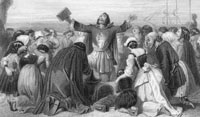 |
| Puritan |
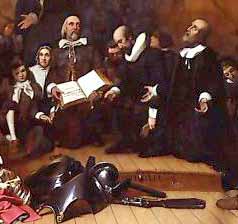 |
Puritan |
 New
England today includes Massachusetts, Connecticut, New Hampshire,
Vermont, Maine and Rhode Island in the Northeast of the United States.
The second enduring English settlement was established in Massachusetts
Bay in 1620. It was founded by English puritans who separated themselves
from the Church of England. As mentioned above, King Henry VIII
cut off the political relationship with the Pope in Rome and set
up the Church of England, but there was no reform in religious beliefs
and practices. A group of people thought that the Church of England
was too catholic and wanted to "purify" the church, hence
the name "puritans". These puritans were Protestants who
followed the doctrine
preached by John Calvin. They had some different religious beliefs
from the Catholic Church. They believed that God was incomprehensible
to man, and the power of God was all-knowing, yet hidden and unknown
to man, while Catholics believed that God could be reached through
his representative on the earth—the Pope. Puritan salvation was
different from that of Catholics. Puritans
were convinced that human beings were predestined
by
God before they were born. Some
were God's chosen people while others were predestined to be
damned
to
hell. Therefore no good works could save anyone, and nobody knew
if he or she was God's elect. But Catholics argued that
a person could confess his or her sin, do good works and give money
to the church and buy back his or her soul. Was there any evidence
for Puritans to show that some people were God's chosen people?
Puritans believed that everyone had a calling,
which was given by God. The
success of one's work or the prosperity in his calling was the sign
of being God's elect.
Therefore,
everyone must work hard, spend little and invest for more business.
Working hard and living a moral
life were their ethics.
How could Puritans find God's will and establish a direct contact
with God? They concluded that the Bible was the authority of their
doctrine. So
every Puritan must read the Bible in order to find God's will and
search for one's individual contact
with
God. To be able to read the Bible and understand God's
will, education was essential
for Puritans. New
England today includes Massachusetts, Connecticut, New Hampshire,
Vermont, Maine and Rhode Island in the Northeast of the United States.
The second enduring English settlement was established in Massachusetts
Bay in 1620. It was founded by English puritans who separated themselves
from the Church of England. As mentioned above, King Henry VIII
cut off the political relationship with the Pope in Rome and set
up the Church of England, but there was no reform in religious beliefs
and practices. A group of people thought that the Church of England
was too catholic and wanted to "purify" the church, hence
the name "puritans". These puritans were Protestants who
followed the doctrine
preached by John Calvin. They had some different religious beliefs
from the Catholic Church. They believed that God was incomprehensible
to man, and the power of God was all-knowing, yet hidden and unknown
to man, while Catholics believed that God could be reached through
his representative on the earth—the Pope. Puritan salvation was
different from that of Catholics. Puritans
were convinced that human beings were predestined
by
God before they were born. Some
were God's chosen people while others were predestined to be
damned
to
hell. Therefore no good works could save anyone, and nobody knew
if he or she was God's elect. But Catholics argued that
a person could confess his or her sin, do good works and give money
to the church and buy back his or her soul. Was there any evidence
for Puritans to show that some people were God's chosen people?
Puritans believed that everyone had a calling,
which was given by God. The
success of one's work or the prosperity in his calling was the sign
of being God's elect.
Therefore,
everyone must work hard, spend little and invest for more business.
Working hard and living a moral
life were their ethics.
How could Puritans find God's will and establish a direct contact
with God? They concluded that the Bible was the authority of their
doctrine. So
every Puritan must read the Bible in order to find God's will and
search for one's individual contact
with
God. To be able to read the Bible and understand God's
will, education was essential
for Puritans.
 Such
Puritan beliefs were heretical
to the Church of England, so they were cruelly persecuted.
Some of them were thrown into prison and even executed
for their religious beliefs. Some of them fought back and started
the English Revolution. Oliver
Cromwell, one of the Puritans, became the revolutionary
leader, overthrew the monarchy, had King Charles I beheaded
and founded a Such
Puritan beliefs were heretical
to the Church of England, so they were cruelly persecuted.
Some of them were thrown into prison and even executed
for their religious beliefs. Some of them fought back and started
the English Revolution. Oliver
Cromwell, one of the Puritans, became the revolutionary
leader, overthrew the monarchy, had King Charles I beheaded
and founded a
|
|
|
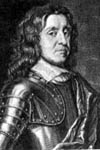 |
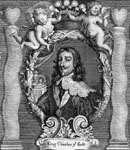 |
|
Cromwell
|
Charles I
|
republic. Some other Puritans thought
that England was too corrupted and hopeless and decided to separate
themselves from England. They fled
to Holland
where there was religious freedom. There they were allowed to meet
and hold their services without interference. But as foreigners,
they were not allowed to join the Dutch guilds
of craftsmen, and so they had to work long and hard at unskilled
and poorly paid jobs. They were further troubled as their children
began to speak Dutch, marry into Dutch families, and lose their
Englishness. Some of the Puritans decided to move again, this time
across the Atlantic, where they might find an opportunity for a
happier living and also worship
as they pleased. The leaders of this group of Puritans found the
necessary funds for the voyage from some merchants in London. In
1620, 35 Puritans and 67 non-Puritans took the ship Mayflower and
left Holland for North America. Before they reached their destination,
one of the Pilgrim
Fathers drew up an agreement which was called Roger Williams
and was signed by 41 of the passengers. They formed their own religious
community and set up a civil government for the general good of
the colony they were going to found in the new land. They settled
at Plymouth, Massachusetts. A much larger Puritan colony was established
in the Boston area in 1630 and by 1635 more Puritan settlers were
migrating to nearby Connecticut.
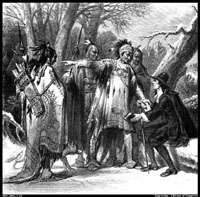 |
| Roger Williams |
 Puritanism
in New England changed gradually due to the frontier environment
and
the mobility
of
the population. As time went on, many of the new generations
no longer adhered
to the orthodox
Puritanism. Many moved to the West and other parts of the United
States. Today,
Puritans are no longer in existence. But their legacies
are
still felt in American society and culture. For example, the Puritans
hoped to build "a city upon hill" an ideal community.
Since that time, Americans have viewed their country
as a great experiment, a worthy
model for other nations. This sense of mission
has been very strong in the minds of many Americans. New England
also established another American tradition—a strain
of often intolerant
moralism.
The Puritans believed that governments should enforce God's morality.
They
strictly punished drunks,
adulterers,
violators
of the Sabbath and other religious believers different from themselves.
Roger Williams, one of the Puritans who protested that the state
should not interfere with religion, was driven out of Massachusetts.
In 1635, he set up Rhode Island colony, which guaranteed religious
freedom and the separation of church and state. The Puritans also
have left rich cultural heritage to future Americans. The
American values such as individualism,
hard
work, respect of education owe
very
much to the Puritan beliefs. Puritanism
in New England changed gradually due to the frontier environment
and
the mobility
of
the population. As time went on, many of the new generations
no longer adhered
to the orthodox
Puritanism. Many moved to the West and other parts of the United
States. Today,
Puritans are no longer in existence. But their legacies
are
still felt in American society and culture. For example, the Puritans
hoped to build "a city upon hill" an ideal community.
Since that time, Americans have viewed their country
as a great experiment, a worthy
model for other nations. This sense of mission
has been very strong in the minds of many Americans. New England
also established another American tradition—a strain
of often intolerant
moralism.
The Puritans believed that governments should enforce God's morality.
They
strictly punished drunks,
adulterers,
violators
of the Sabbath and other religious believers different from themselves.
Roger Williams, one of the Puritans who protested that the state
should not interfere with religion, was driven out of Massachusetts.
In 1635, he set up Rhode Island colony, which guaranteed religious
freedom and the separation of church and state. The Puritans also
have left rich cultural heritage to future Americans. The
American values such as individualism,
hard
work, respect of education owe
very
much to the Puritan beliefs.
Previous Page Next
Page
|

